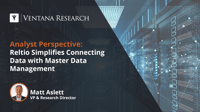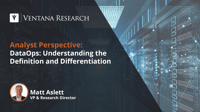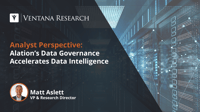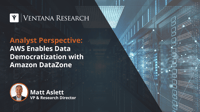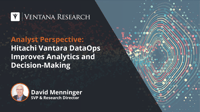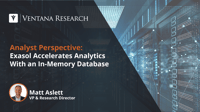As engagement with customers, suppliers and partners is increasingly conducted through digital channels, ensuring that infrastructure and applications are performing as expected is not just important but mission critical. My colleague, David Menninger, recently explained the increasing importance of observability to enable organizations to ensure that their systems and applications are operating efficiently. Observability has previously been the domain of the IT department but is increasingly...
Read More
Topics:
Data Management,
Data,
Digital Technology,
Analytics & Data
To execute more data-driven business strategies, organizations need linked and comprehensive data that is available in real time. By consistently managing data across siloed systems and ensuring that data definitions are agreed and current, organizations can overcome the challenges presented by data being distributed across an increasingly disparate range of applications and data-processing locations. Maintaining data quality is a perennial data management challenge, often preventing...
Read More
Topics:
Data Management,
Data,
data operations
Data Operations (DataOps) has been part of the lexicon of the data market for almost a decade, with the term used to describe products, practices and processes designed to support agile and continuous delivery of data analytics. DataOps takes inspiration from DevOps, which describes a set of tools, practices and philosophy used to support the continuous delivery of software applications in the face of constant changes. DataOps describes a set of tools, practices and philosophy used to ensure...
Read More
Topics:
Data Governance,
Data Management,
Data,
data operations
As data continues to grow and evolve, organizations seek better tools and technologies to employ data faster and more efficiently. Finding and managing data remains a perennial challenge for most organizations, and is exacerbated by increasing volumes of data and an expanding array of data formats. At the same time, organizations must comply with a growing list of national and regional rules and regulations, such as General Data Protection Regulation and the California Consumer Privacy Act....
Read More
Topics:
Data Governance,
Data Management,
Data,
data operations
I have previously written about the importance of data democratization as a key element of a data-driven agenda. Removing barriers that prevent or delay users from gaining access to data enables it to be treated as a product that is generated and consumed, either internally by employees or externally by partners and customers. This is particularly important for organizations adopting the data mesh approach to data ownership, access and governance. Data mesh is an organizational and cultural...
Read More
Topics:
Cloud Computing,
Data Governance,
Data Management,
Data,
Digital Technology,
data operations,
Analytics & Data
Now more than ever, effective data management is crucial to enable decision-makers to better assess information and take calculated actions. It is also important to keep up with the latest trends and technologies to derive higher value from data and analytics and maintain a competitive edge in the market. However, every organization faces challenges with data management and analytics. And as organizations scale, the complexity only increases, creating a need for better data governance, data...
Read More
Topics:
Analytics,
Data Governance,
Data Management,
Data,
data operations,
Analytic Data Platforms
Organizations require faster analytics to continuously improve business operations and stay competitive in today’s market. However, many struggle with slow analytics due to a variety of factors such as slow databases, insufficient data storage capacity, poor data quality, lack of proper data cleansing and inadequate IT infrastructure. Challenges such as data silos can also decrease operational efficiency. And as the data grows, performing complex data modelling becomes challenging for users as...
Read More
Topics:
Data Management,
Data,
Analytic Data Platforms
We live in a time of uncertainty, not unpredictability. Managing an organization in uncertain times is always hard, but tools are available to improve the odds for success by making it easier and faster to plan for contingencies and scenarios. Software makes it possible to quickly consider the impact of a range of events or assumptions and devise a set of plans to deal with them. Dedicated planning and budgeting software has been around for decades but is about to become all the more useful as...
Read More
Topics:
Office of Finance,
Data Management,
Business Planning,
digital finance,
AI & Machine Learning
The market for data and analytics products is constantly evolving, with the emergence of new approaches to data persistence, data processing and analytics. This enables organizations to constantly adapt data analytics architecture in response to emerging functional capabilities and business requirements. It can, however, also be a challenge. Investments in data platforms cannot be constantly written-off as organizations adopt new products for new approaches. Too little change can lead to...
Read More
Topics:
Data Governance,
Data Management,
Data,
data operations
Data observability was a hot topic in 2022 and looks likely to be a continued area of focus for innovation in 2023 and beyond. As I have previously described, data observability software is designed to automate the monitoring of data platforms and data pipelines, as well as the detection and remediation of data quality and data reliability issues. There has been a Cambrian explosion of data observability software vendors in recent years, and while they have fundamental capabilities in common,...
Read More
Topics:
Cloud Computing,
Data Management,
Data,
Digital Technology,
data operations,
Analytics & Data


